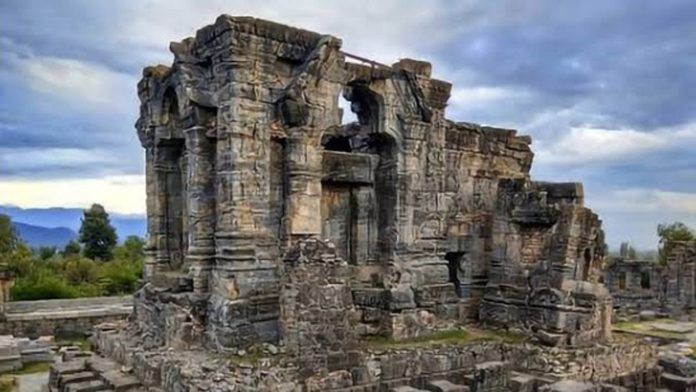DE Web Desk
JAMMU, Mar 30: Jammu and Kashmir administration has convened an officers meeting here next week to discuss ‘protection, conservation and restoration’ of an eighth-century old Martand Sun temple in Anantnag district.
The temple located at village Kehribal area of Mattan, some 63-km south of Srinagar, is considered as the oldest of the Sun temples in the country and a symbol of invaluable ancient spiritual heritage. It has been declared as a site of national importance by Archaeological Survey of India (ASI) and also appears in the list of centrally protected monuments.
Follow the Daily Excelsior channel on WhatsApp
According to a notice issued by Jammu and Kashmir department of culture, a meeting has been convened at Civil Secretariat in Jammu on April 1 to discuss the matter regarding protection, conservation and restoration of the ancient temples in Kashmir with installation of Emperor Lalitaditya Muktapida in the premises of Martand Sun temple.
The meeting, to be chaired by Principal Secretary, will be attended among others by Director Archives, Archaeology and Museums (J-K), superintendent of Archaeologist (incharge) ASI (Srinagar circle).
Thousands of pilgrims including Kashmiri Pandits visit the temple every year and have been demanding its restoration.
In May 2022, Lt Governor Manoj Sinha took part in ”Navgrah Ashtamangala Pooja’ at the temple which was protested by ASI as “violation of rules” for not seeking required permission. However, J-K administration defended the pooja citing rule 7(2) of the Ancient Monuments and Archaeological Sites and Remains Act, which states that this should not apply to any event held “in pursuance of a recognised religious usage or custom”.
Built on the top of a plateau, the temple ruins and related archaeological findings revealed that it was an excellent specimen of Kashmiri architecture, which had blended the Gandharan, Gupta and Chinese forms of architecture.
The temple has a colonnaded courtyard, with its primary shrine in its centre and surrounded by 84 smaller shrines, stretching to be 220 feet long and 142 feet broad total and incorporating a smaller temple that was previously built.


